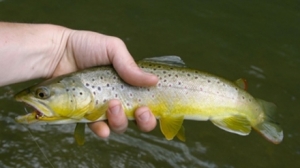Solving Urban Runoff Water-Quality Problems
November 15, 2016

McLoud Run brown trout. Photo courtesy of City of Cedar Rapids.
Much of the water-quality focus in Iowa is on non-point source pollution from agriculture. Nonetheless, urban stormwater runoff does affect our streams and is an important component of the overall water-quality picture. To that end, IIHR—Hydroscience & Engineering, in collaboration with the City of Cedar Rapids Public Works Department, has installed real-time water-quality sensors on a stormwater outfall on McLoud Run.
McLoud Run, Iowa’s only urban trout stream, is a one-of-a-kind resource. The streambanks are mostly wooded, and cold water percolates into the stream from limestone springs, making the water suitable for trout. Each year, the Iowa Department of Natural Resources (IDNR) stocks McLoud Run with 3,000 brown trout, 2,000 rainbow trout, and 1,000 brook trout. Many other clean-water fish species inhabit the stream as well.
Flowing through an urban setting makes the stream highly vulnerable to flashy runoff events and the pollutant load that they can carry. Just this past May, the stream experienced a fish kill resulting in 319 dead fish. The event was so brief that water-quality parameters like pH, dissolved oxygen, and temperature were back to acceptable levels by the time the fish kill was reported and acted upon.
IIHR’s sensor array is measuring nitrate, pH, temperature, and specific conductance. If another fish kill occurs, this equipment should be able to provide clues as to the causes, which in turn will help city and IDNR staff investigate solutions to prevent future recurrences. The data will also help city staff with their efforts to improve overall water quality in the watershed. Stormwater Coordinator Cara Matteson of the City of Cedar Rapids Public Works Department says the partnership with IIHR is a great step forward. “This will give us a good starting off point for our watershed efforts.”
The data generated by the sensors can viewed in real time at IIHR’s Water-Quality Information System (WQIS) website (https://iwqis.iowawis.org/).



